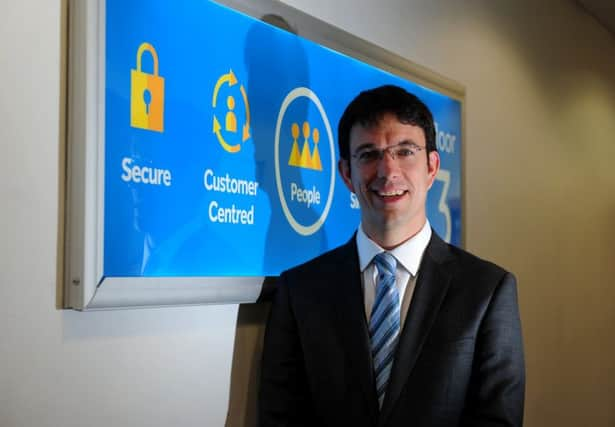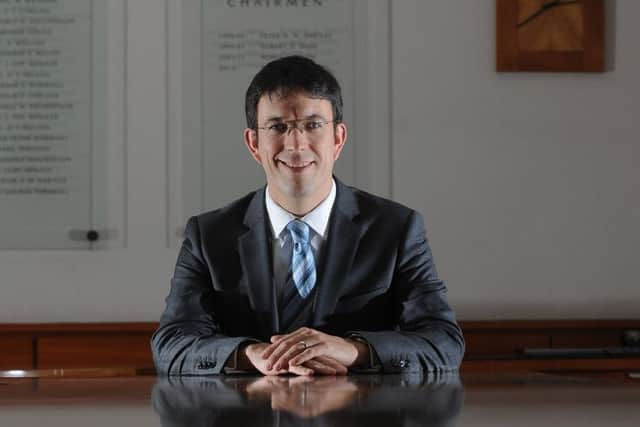Leeds Building Society records robust performance in ‘uncertain times’


Read more


The mutual’s chief executive Richard Fearon predicted that Leeds was well-placed to become a thriving fintech centre.
He said Channel 4’s decision to establish its headquarters in Leeds also provided the city with a “feather in the cap” to attract investors.
Advertisement
Hide AdAdvertisement
Hide AdHe added: “We are continuing to invest so we can face the future with confidence.”
He said the society’s status as a mutual was a source of strength, adding: “We don’t have shareholders chasing short term returns.”
He said the mutual would continue to focus on borrowers who are not well served by the wider market.
In the first half of the year the business increased residential mortgage balances by 4.4 per cent to £16.5bn, supported by new lending of £1.9bn.
Advertisement
Hide AdAdvertisement
Hide AdThe mutual attracted 5.2 per cent more savings balances, taking total assets above £20bn for the first time.
In a statement, the society said: “During that period, the society helped 32,000 more people to save, as well as 20,000 more to have the home they want, including 6,000 who moved into their very first home. Successfully meeting the needs of first time buyers was what led to the formation of building societies such as Leeds more than 140 years ago.”
The society said it had continued to provide support for its members by offering competitive products and services despite economic uncertainty.
The statement added: “Sustained pressure on mortgage pricing and high levels of refinancing has translated into lower mortgage income and, without an equivalent reduction in funding costs, has suppressed net interest income.”
Advertisement
Hide AdAdvertisement
Hide Ad“The underlying strength of the mortgage book remains high with a low level of arrears and continued high quality security; albeit a worsening view of forecast economic conditions has negatively impacted expectations of credit losses and resulted in increased charges for impairment loss provisions.”
Despite these pressures, the society said it had reported a “robust” profit of £49.4m, compared with £60.1m in the same period last year. The society added: “The society’s resilience was further enhanced a year ago when the Prudential Regulation Authority granted it IRB (Internal Ratings Based) permission, empowering the business to assess its own capital requirements for credit risk using internal models.”
“CET1 and total capital ratios of 30.3 per cent and 37.0 per cent respectively are among the strongest risk-based measures of any UK bank or building society and the leverage ratio of 5.4 per cent is well above regulatory requirements.”
The mutual said that its investment plans are also progressing well.
Advertisement
Hide AdAdvertisement
Hide AdWork has started to fit out the society’s new Leeds headquarters and the phased upgrading to lending systems is underway.
“Both projects are major commitments to future service improvements which also will boost efficiency and save money,’’ the company said.
Mr Fearon said the building society model of focusing on long term value for the benefit of its membership as a whole continues to be a guiding principle which enables the business to remain secure and stable, even through times of external economic upheaval.
“The society stays true to the purpose for which it was founded, to help people save and have the home they want, and we continue to lend responsibly and grow in a prudent and carefully-managed way,” he said
Advertisement
Hide AdAdvertisement
Hide Ad“This is despite the challenging headwinds in the UK economy and the impact of cooling consumer confidence.
“As expected, increased competition and the effects of slowing economic growth have had an impact on our profit levels. Similarly, we knew our ongoing investment in member value and our digital capabilities would affect profits - while these have reduced this year they remain at a healthy level.
“Our cost to income and cost to mean asset ratios of 49.4% and 0.50% respectively are among the best in the sector, and we retain our keen cost focus.
“Following planned high levels of growth over several years, the society has made a conscious choice to moderate increases in mortgage and savings balances to focus on margin.
Advertisement
Hide AdAdvertisement
Hide Ad“We’ll continue to pursue our strategy of supporting borrowers who are not well-served by the wider market – such as through Shared Ownership, Interest Only and Buy to Let - as we keep looking for new ways to respond to the evolving needs of our members. Our approach was recognised when What Mortgage magazine awarded us the accolade of ‘Best Shared Ownership Lender’ for the fourth consecutive year. We’ve also built on last year’s launch of our Retirement Interest Only proposition and seen rising demand in this new segment of later life lending.
The chief operating officer, Karen Wint, has advised the board that she plans to retire next year.
Mr Fearon said: “Karen has made an outstanding contribution over many years to assuring the long term success of the society by leading our people and diversity agenda, making Leeds Building Society an employer of choice, improving our IT and cyber resilience and initiating the move to our new Leeds headquarters. I would like to thank Karen for her tremendous care and passion for the Society.”
Significant support from staff for the society’s first national charity partner the Samaritans means fundraising is nearing its £250,000 target, seven months ahead of schedule.
Advertisement
Hide AdAdvertisement
Hide AdAll executive directors have voluntarily opted to move to the existing colleague pension scheme, with effect from September 1, without any compensation for the loss in benefits thus reducing the cost to the society.
Mr Fearon said doing the right thing – for colleagues, members and communities – would continue to shape business strategy and practice, as it had done throughout the society’s long history, adding:
“Our commitment to long term stability for the benefit of our membership as a whole means we are well-placed to withstand economic shocks and market uncertainty.”